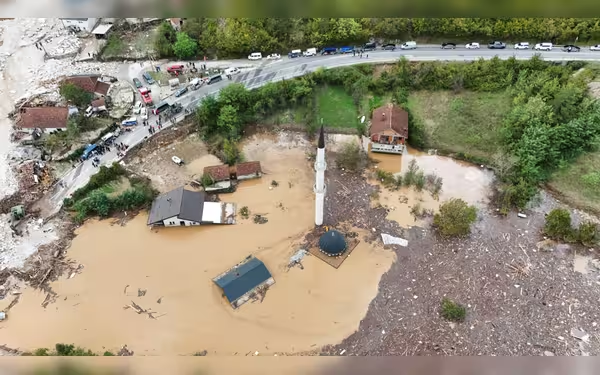Saturday, November 16, 2024 09:26 PM
International Rescue Teams Mobilize in Bosnia After Catastrophic Floods
- International teams assist Bosnia after devastating floods.
- At least 18 lives lost, many injured in disaster.
- EU activates Civil Protection Mechanism for support.
 Image Credits: arabnewspk
Image Credits: arabnewspkInternational rescue teams arrive in Bosnia to assist after catastrophic floods and landslides, resulting in significant loss of life and property.
SARAJEVO, Bosnia-Herzegovina: In a tragic turn of events, Bosnia and Herzegovina has been struck by devastating floods and landslides, prompting international rescue teams to mobilize and assist in the recovery efforts. The calamity unfolded after a heavy rainstorm on Friday night, which inundated entire regions, leading to the destruction of roads and bridges. The aftermath has been catastrophic, with at least 18 lives lost and many others injured.
In response to this disaster, Bosnia has reached out for assistance from the European Union. EU Commission President Ursula von der Leyen expressed her solidarity, stating, "Our hearts and thoughts are with the people of Bosnia and Herzegovina, hit by devastating floods." She announced the activation of the EU Civil Protection Mechanism, which has facilitated the deployment of rescue teams to the affected areas. This is a clear demonstration of EU solidarity in action.
As rescue operations continue, officials have reported that at least 10 individuals remain unaccounted for, particularly in the village of Donja Jablanica. This village has been almost entirely buried under rocks and debris from a nearby quarry. Residents recounted harrowing experiences, with one local, Munevera Dautbegovic, recalling, "We heard water and rock coming down from the hill. I told my son, Let’s go up to the attic, we don’t know what’s going to happen." The sheer force of nature was evident as homes vanished before their eyes.
Regional Governor Nermin Niksic visited the village, promising support for rebuilding efforts. He poignantly remarked, "All material damage can be compensated somehow but human lives cannot. Grief will stay on." The severity of the situation was underscored by meteorologist Nedim Sladic, who noted that the region received as much rain in six hours as it typically does in three to four months.
Ecologists have pointed out that the floods have been exacerbated by years of neglect, including deforestation and uncontrolled construction, which have intensified the effects of climate change. This disaster is not isolated to Bosnia; other parts of Europe are also grappling with severe weather, including flooding, extreme heat, and wildfires.
Admir Poturovic, a resident of Trusina, expressed the emotional toll of the disaster, stating, "Everything that my father created and that I have created after him disappeared in 30 minutes. But life goes on. One has to move on." This sentiment reflects the resilience of the Bosnian people, who have faced numerous challenges since the brutal war of 1992-95.
As the situation unfolds, rescue teams from neighboring countries, including Croatia and Serbia, have already arrived, with additional support expected from Slovenia, Montenegro, North Macedonia, Poland, Czechia, and Turkiye. The urgency of the situation is further complicated by the fact that Sunday marks a local election date in Bosnia, with authorities postponing voting in flood-affected regions.
Ismeta Bucalovic, a resident of Sarajevo, shared her feelings, saying, "We are all overwhelmed by these flooding events. We all think only about that." This disaster serves as a stark reminder of the vulnerabilities faced by impoverished and ethnically divided nations like Bosnia, which continue to struggle with political instability and corruption, hindering their recovery and progress towards EU membership.
The floods in Bosnia and Herzegovina highlight the urgent need for effective disaster management and environmental protection. As the nation grapples with the aftermath of this tragedy, the support from international communities is crucial. It is a time for solidarity, resilience, and a collective effort to rebuild not just the physical structures, but also the hope and spirit of the people.













